Militarism vs. Mass Action - Which Road for Irish Struggle?
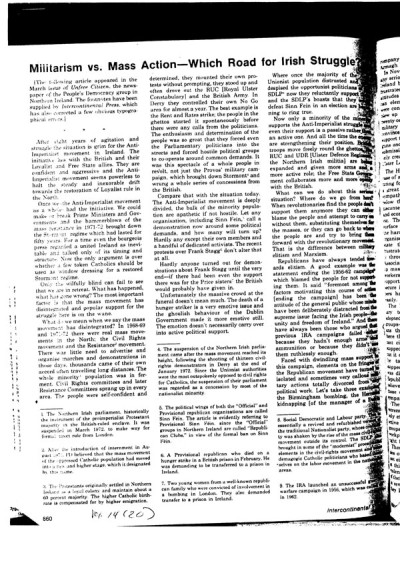
| Date: | 1976 |
|---|---|
| Organisation: | People's Democracy |
| View: | View Document |
| Discuss: | Comments on this document |
| Subjects: |
Please note: The Irish Left Archive is provided as a non-commercial historical resource, open to all, and has reproduced this document as an accessible digital reference. Copyright remains with its original authors. If used on other sites, we would appreciate a link back and reference to The Irish Left Archive, in addition to the original creators. For re-publication, commercial, or other uses, please contact the original owners. If documents provided to The Irish Left Archive have been created for or added to other online archives, please inform us so sources can be credited.
Commentary From The Cedar Lounge Revolution
18th October 2010
Many thanks to the person who forwarded this to the Archive.
This is an article, from Intercontinental Press, which reprints a article in the March 1976 edition of Unfree Citizen, newspaper of People's Democracy (apologies for the quality, but it is a scan of a photocopy). Its significance is that it charts a turn by the admittedly small PD from a quasi militarist rhetorical stance to one of mass action in Northern Ireland. In a way this echoes arguments which had already taken place in Official Sinn Féin and were to take place in Provisional Sinn Féin at a later point (indeed as has been mentioned before the influence of those who arrived from People's Democracy in PSF in the mid-1980s on that party's eventual positions is worthy of consideration in its own right).
Of interest is an inset box on the second page which outlines the history of People's Democracy from radical student activist movement through various splits, 'a sectarian position to nationalism - it followed a policy designed to drive the 'Catholic capitalists' out of the movement', a turn towards 'revolutionary nationalism' and 'in early 1975 it became clear that it was experimenting with forming its own armed wing'. It concludes 'Now, with the decline of the Provisional military campaign, PD has evidently decided to make a new reorientation.'
The overall thesis of the article is pessimistic, pointing to a change in a dynamic from a point where 'we, the Anti-Imperialist movement as a whole had the initiative. We could make or break Prime Ministers and Governments and the hammerblows of mass resistance in 1971-1972 brought down the Stormont regime which had lasted fifty years.
And it notes that 'it was this spectacle of the whole people in revolt, not just the Provos' military campaign which brought down Stormont and wrung a whole series of concessions from the British'.
There's an oddly jarring reference, at least in retrospect, to the death of Frank Stagg, 'Unfortunately the massive crowd at the funeral doesn't mean much. The death of a hunger striker is a very emotive issue and the ghoulish behaviour of the Dublin Government made it more emotive still. The emotion doesn't necessarily carry over into active political support'.
This is contextualised by reference to the changing nature of the armed struggle in the North from the high point of the very early 1970s to a diminishing level with distinctively different characteristics which the article views as 'elistist and militarist'.
From all of which it determines that 'The mass movement is all important; physical force, though certainly necessary, is only one of its weapons in the battle and we believe that armed struggle which is not backed by the masses cannot make a revolution'.
More from People's Democracy
People's Democracy in the archive
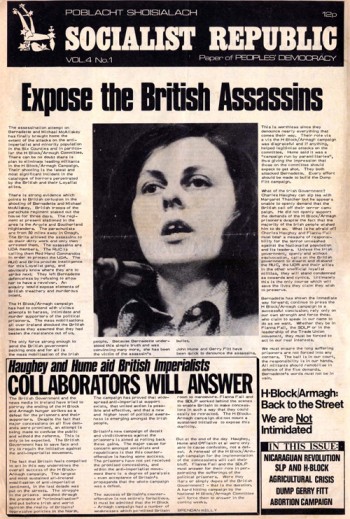
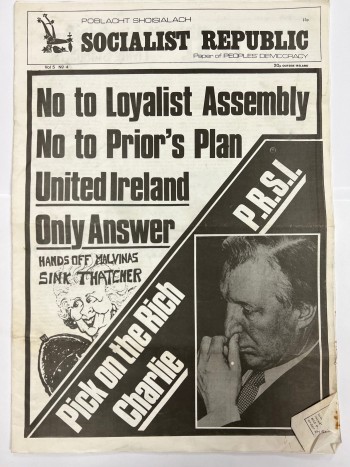
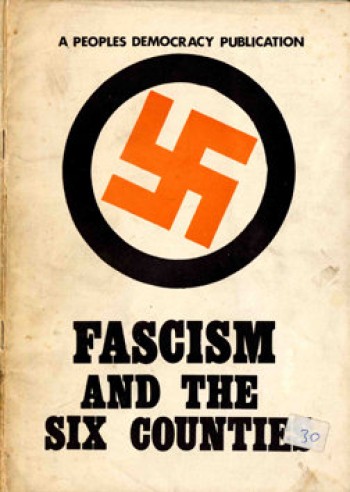
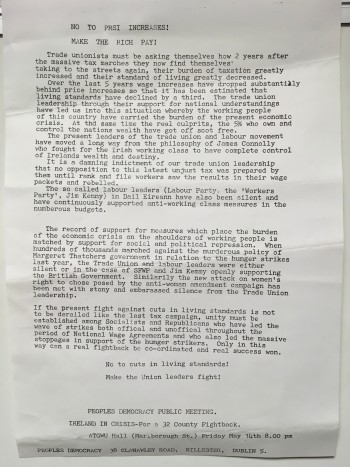
Comments
No Comments yet.
Add a Comment
Comments can be formatted in Markdown format . Use the toolbar to apply the correct syntax to your comment. The basic formats are:
**Bold text**
Bold text
_Italic text_
Italic text
[A link](http://www.example.com)
A link
You can join this discussion on The Cedar Lounge Revolution
By: Starkadder Wed, 20 Oct 2010 10:18:52
Intercontinental Press? They used to work with the
Revolutionary Marxist Group as well.
Reply on the CLR
By: Bakunin Wed, 20 Oct 2010 20:40:50
Socialist Workers Party in the US.
Gerry Foley published most his analysis on Ireland in that publication. It had interesting stuff on South Africa, the Palestinians, and the USSR.
It was a great publication — came out every two weeks for most the 1970s up until 1983, I think. It was printed on lousy paper, and you would be covered in black ink when you read it. Sweet.
Reply on the CLR
By: Garibaldy Wed, 20 Oct 2010 21:15:39
I thought this was a really interesting article. I think the account of the early 1970s probably accurate reflects how a lot of people felt, but wasn’t necessarily the case. As noted above, echoes of debates elsewhere. Be interested to know who wrote it and what position the author/faction whose opinion it represented ended up in.
Reply on the CLR
By: NollaigO Thu, 21 Oct 2010 06:48:38
In reply to Garibaldy.
I thought the boxed article summarising the evolution of the People’s Democracy was interesting and accurate. As Bakunin notes, this was probably written by Gerry Foley, an American trotskyist.
IIRC, by the time that article was written, People’s Democracy was a small grouping of under 50 members mainly based in Belfast and London. Their best known member was Michael Farrell. By 1977 they were cooperating closely with the Movement for a Socialist Republic [MSR,formerly the RMG. Both groups merged and kept the name Peoples Democracy. The high point of the new group was during the H block campaign during which they won seats in the 6 County local council elections. After that many left the group and joined Sinn Féin. The few remaining(if the use of the word “few” is not an exaggeration) are members of the Socialist Democracy.
As Bakunin notes, Gerry Foley wrote several articles on Ireland in the Intercontinental Press in the 1970s. He also published a number of interviews with leading republicans. Many of these would be worthy of reprinting including his obituary tributes to Liam McMillan and Malachy McGurren. I read an article, somewhere on the internet, a couple of years ago which stated that Foley was deported from Ireland in the 1980s. I have been unable to find the article since or confirm whether this claim is accurate.
Reply on the CLR
By: Neues aus den Archiven der radikalen (und nicht so radikalen) Linken « Entdinglichung Thu, 21 Oct 2010 08:30:11
[…] People’s Democracy: Militarism vs. Mass Action – Which Road for Irish Struggle? […]
Reply on the CLR